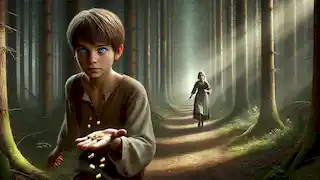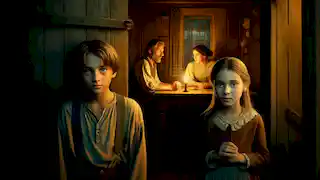Chapter 1: The Beginning
Once upon a time, in a small village at the edge of a vast forest, lived a poor woodcutter with his wife and two children. The boy's name was Hansel and the girl's name was Gretel. They lived in a humble cottage, their bellies often empty and their hearts burdened with worry.
The woodcutter's second wife often thought of ways to be rid of the children, for there was not enough food for them all. One evening, after the children had gone to bed, she said to her husband, "Listen, husband, we have too little to eat for us all. Tomorrow, we must take the children into the forest and leave them there. They will find their own way, or perish."
The woodcutter, though sorrowful, reluctantly agreed to his wife's plan. He did not have the strength to oppose her, and the pangs of hunger were too strong.
Hansel and Gretel, however, overheard the conversation. Gretel wept bitterly, but Hansel comforted her, saying, "Do not cry, dear sister. I will find a way to save us."
When the house had grown quiet and all were asleep, Hansel slipped out of bed, put on his coat, and crept outside. The moon shone brightly, illuminating the white pebbles scattered around. Hansel filled his pockets with as many as he could carry and returned to bed.
In the morning, before the sun had risen, the stepmother woke the children. "Get up, you lazybones," she cried, "we are going to the forest to fetch wood." She gave each a piece of bread and said, "Here is something for your midday meal. Do not eat it before then, for you will get nothing else."
Gretel put the bread under her apron, as Hansel's pockets were full of pebbles. As they walked into the forest, Hansel stayed behind, dropping a white pebble here and there along the way. When they reached the heart of the forest, the father said, "Gather wood, children, and I will make a fire so you will not be cold."
Hansel and Gretel gathered twigs and branches and made a small pile. The woodcutter lit the fire, and when the flames were high, the stepmother said, "Lie down by the fire and rest. We will go and chop wood. When we are done, we will come back to get you."
Hansel and Gretel sat by the fire, and when midday came, they ate their pieces of bread. They waited and waited, but no one came to get them. As the fire burned down, they grew tired and fell asleep.
When they awoke, it was dark, and Gretel began to cry. But Hansel comforted her, saying, "Wait a little, until the moon rises, and we will find our way home." When the moon rose, its light reflected off the white pebbles, showing them the way back. They walked all night and by dawn had reached their father's house.
The woodcutter was overjoyed to see them, for he had not wanted to abandon them. But the stepmother was angry, and soon she began plotting again.
Chapter 2: The Second Abandonment
Not long after, there was even less food in the house, and the stepmother decided to take the children even deeper into the forest. This time, Hansel tried to collect pebbles again, but the door was locked, and he could not get out. Instead, he comforted Gretel, "Do not be afraid. Sleep well, dear sister. God will help us."
Early in the morning, the stepmother woke the children. She gave them each a piece of bread, even smaller than before. On the way to the forest, Hansel crumbled his bread in his pocket, often stopping to drop a crumb on the ground.
The stepmother led them deep into the forest, where they had never been before. Again, they gathered wood, and the father lit a fire. The stepmother told them, "Sit here, children, and if you get tired, you can sleep. We are going into the forest to chop wood and will come back to get you."
At midday, Gretel shared her bread with Hansel, for he had used his to mark the way. But when they tried to follow the breadcrumbs home, they found that birds had eaten them. They wandered through the forest all night and into the next day, but they could not find their way. They were so tired that they lay down under a tree and fell asleep.

Chapter 3: The Gingerbread House
When they woke, they continued to wander until they came upon a beautiful white bird. It perched on a branch and sang so sweetly that they stopped to listen. When it flew away, they followed it until they reached a clearing where a strange house stood.
The house was made entirely of bread, with a roof of cake and windows of clear sugar. Hansel and Gretel were so hungry that they began to eat pieces of the house. Hansel broke off a piece of the roof, and Gretel nibbled on a windowpane.
As they were eating, a voice called out from inside, "Nibble, nibble, little mouse, who is nibbling at my house?" The children answered, "It's the wind, the wind, the heavenly child."
Suddenly, the door opened, and an old woman with a bent back and a cane hobbled out. "Come in, come in, children," she said kindly. "You must be tired and hungry. Come inside, and I will take care of you."
Hansel and Gretel followed her into the house, where she set before them a feast of pancakes with sugar, apples, and nuts. After they had eaten, she showed them two little beds, and they lay down and fell asleep.
{{{_03}}}
Chapter 4: The Witch's Trap
The old woman was actually a wicked witch who lured children into her house to eat them. Although she seemed kind, her heart was full of malice. The next morning, before the children awoke, she looked at them sleeping and smiled wickedly, "They will be a fine meal for me."
She grabbed Hansel and locked him in a small cage. Then she shook Gretel awake and shouted, "Get up, lazybones! Fetch water and cook something good for your brother. He is in the stable and must be fattened up. When he is fat enough, I will eat him."
Gretel began to cry, but it was all in vain. She was forced to do the witch's bidding. Hansel was given the best food, but Gretel received nothing but scraps. Every morning, the witch came to the cage and shouted, "Hansel, stick out your finger so I can see if you are fat yet."
But clever Hansel held out a little bone instead. The witch, who had poor eyesight, felt the bone and thought it was his finger. She wondered why he was not getting any fatter, but she kept feeding him.
{{{_04}}}
Chapter 5: Gretel's Bravery
After four weeks, the witch grew impatient. "Hansel, fat or thin, tomorrow I will kill and cook you," she said. She ordered Gretel to fetch water and prepare the stove. Gretel, weeping bitterly, did as she was told.
The witch said, "First, we will bake. I have already heated the oven and kneaded the dough." She pushed Gretel towards the oven and said, "Crawl in and see if it is hot enough to bake the bread."
But Gretel, sensing the witch's plan, said, "I do not know how to do that. How do I get in?"
"Stupid girl!" snapped the witch. "The opening is big enough. See, I could get in myself." She then leaned over and stuck her head into the oven. Quickly, Gretel gave her a push, and the witch tumbled in. Gretel shut the door and bolted it. The witch screamed and cursed, but Gretel did not let her out until she was burned to ashes.
{{{_05}}}
Chapter 6: The Escape
Gretel ran to Hansel's cage and opened it. "Hansel, we are saved!" she cried. The children hugged each other and danced with joy. Since there was nothing to fear, they explored the witch's house. They found chests of jewels and gold coins.
"These are better than pebbles," said Hansel, filling his pockets. Gretel also took some, and they left the house. They walked for many hours and eventually found their way back to their father's house.
The woodcutter was overjoyed to see his children safe. He had been heartbroken since they had disappeared and had driven his wife away. Now, with the jewels and gold they had brought back, they all lived happily ever after.


















